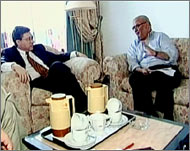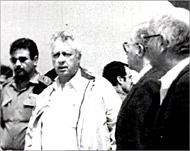Where is the peace?
Three years into the current Intifada, Palestinians and Israelis agree on one issue: their 12-year peace process has never been at such a low point.

The first Intifada erupted in 1987 and ran until 1993. The 1991 Madrid peace conference and 1993 Oslo peace accords were its outcome.
The uprising ended because of the promise that within five years final status issues would be settled and a Palestinian homeland would be established. But they are yet to happen.
“In the first Intifada in 1987, our message was we will not accept occupation forever. We will not accept subjugation. We want peace,” said Dr Saib Uraikat, chief Palestinian negotiator.
More than 10 years later, that message is still the same.
“We are still fighting to end the occupation. We still want peace,” said the veteran peace negotiator.
Lifeless process
“We do not have a peace process – not even a minimal component of a peace process,” said Dr Azmi Bashara, a Palestinian Member of Israel’s Knesset (parliament).
Over the last three years any trust that was painstakingly built between the two sides has been shattered.
|
“In the first Intifada in 1987 our message was we will not accept occupation forever…We are still fighting to end the occupation. We still want peace.” Saib Uraikat, chief Palestinian peace negotiator |
“All parties concerned made possible and impossible mistakes,” said Yossi Sarid, another Israeli parliamentarian.
“The mutual trust is totally lost and it is very easy to destroy that trust but almost impossible to rebuild that trust.”
In the run-up to the Intifada, Palestinians and Israelis were involved in intense negotiations to broker an end to the conflict. Even four months after the uprising erupted in September 2000, delegations met in Taba, Egypt to hammer out a deal.
“Before the Intifada there were talks and signs of hope. Now this has disappeared,” said Sarid bleakly.
Hopes at Taba
Palestinians and Israelis were closest to clinching a deal ending more than half a century of pain at Taba, an Egyptian resort on the Red Sea.
From 21 to 27 January 2001 Palestinian and Israel delegations, mediated by the European Union’s special Middle East envoy Miguel Angel Moratinus, worked to find common ground on issues including refugees, security, borders and the fate of Jerusalem.
At Taba, Israel presented a contiguous map of the West Bank, unlike the proposal put forward at Camp David in July 2000.
At the US presidential retreat of Camp David, the then Israeli Prime Minister Ehud Barak had proposed annexing a strategic chunk of the occupied West Bank and creating Palestinian cantons surrounded by Jewish settlements.
The West Bank would be further divided by “bypass roads” snaking throughout the future “independent” Palestinian state.
 |
|
Yossi Beilin (L) with Saib Uraikat |
In the end, this proved the talks’ undoing.
Sparks of hope, however, flickered at the Taba negotiations.
They were “unprecedented in their positive atmosphere and expression of mutual willingness to meet the national, security and existential needs of each side,” according to a joint statement issued by the two sides following the negotiations.
“The sides declare that they have never been closer to reaching an agreement and it is thus our shared belief that the remaining gaps could be bridged with the resumption of negotiations following the Israeli elections,” according to the optimistic statement.
But when Ariel Sharon was elected Israel’s prime minister in February 2001, he immediately declared an end to all talks until Palestinians halted their uprising against Israel’s occupation.
“We needed more time,” said Uraikat.
Reviving the spirit
Both sides are pessimistic about the future of the Palestinian question in the current climate.
Peace talks such as Taba cannot take place today because the negotiators on the Israeli side – “the champions of that source of reason in peace” – have all but vanished, said Bashara.
|
“If we are waiting for the world, the world will not save us.” Yossi Beilin, Israeli MK |
Sarid echoed similar sentiments.
“With Ariel Sharon and Yasir Arafat it will be difficult to revive spirit of Taba,” he said, adding the two sides were not even ready to sit down for such serious negotiations.
But Uraikat stressed the only road to peace was through talks.
“You cannot solve the situation through the construction of walls or settlements. Assassinations will not bring peace,” he said. “Negotiations will save lives on both sides.”
Despite Israel’s continuing occupation, Uraikat is optimistic.
“Peace is inevitable between the Palestinians and Israelis,” he said.
Yossi Beilin, an Israeli MK, said the peace process could be revived if both sides took the initiative.
“If we are waiting for the world, the world will not save us,” said Beilin, who was heavily involved in the Oslo peace accords and the Taba talks.
Lessons learned
When the first Intifada erupted, Yitzhak Shamir held the reins of power in Israel. Bashara said Shamir preferred to deal with the uprising through the use of force. The former Israeli premier also refused to have any contacts with the PLO.
The late Yitzhak Rabin, who succeeded Shamir, took a different tack. He opted to negotiate directly with the PLO, which led to the 1993 Oslo peace accords.
 |
|
Ariel Sharon (C) believes in |
“Sharon’s government is handling the Intifada in a manner similar to the Shamir government,” said Bashara.
The Israeli premier believes in flexing Israel’s military might to break the will of the other side, illustrated by the fact that “Sharon believes the most successful war was in 1982”.
He was referring to Sharon’s disastrous invasion of Lebanon, crowned by the Sabra and Shatila massacres. More than 2000 civilians were slaughtered under Sharon’s command, who was then Israel’s defence minister.
“Sharon believes the Israelis should be patient,” added Bashara.
Sarid warned against using force to solve the current conflict.
“If both sides lean on force, we are in the middle of a tragedy. Nothing can be achieved through the military: neither by the Israelis not the Palestinians,” he said.
More potent
As the Israeli premier intensifies his crackdown on the current uprising, Palestinians vow the Intifada will not end on Sharon’s terms.
Over the past three years, Hebron resident Nasr Kawasami has seen his sister shot and critically wounded by Israeli soldiers as she had her morning coffee with neighbours during an invasion.
 |
|
Palestinian children are forced |
|
|
|
|
He was also shot in the arm, leading to temporary paralysis and was only able to fully re-gain use of it after a costly operation in neighbouring Amman.
Kuwasami vowed the new Palestinian generation living under Israel’s occupation will be more potent resistance fighters because “they’ve seen their brothers and schoolmates killed”.
The Intifada will not come to a halt any time soon, he added.
“There’s nothing for us to live for: no land, no state, no nothing.”